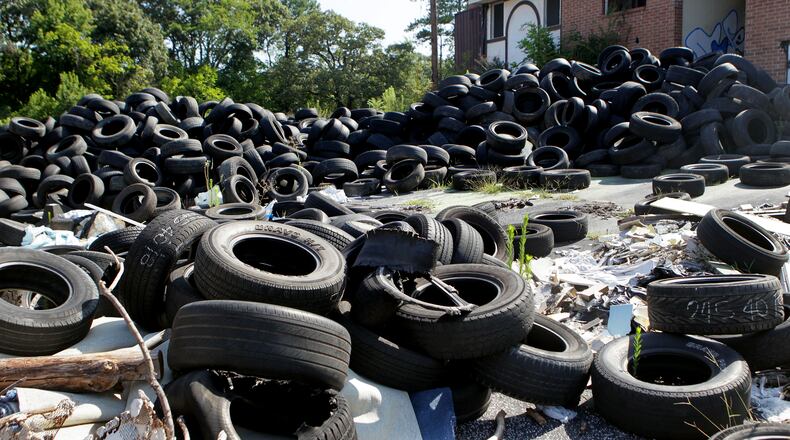Gov. Brian Kemp’s team filed legislation Wednesday to implement a constitutional amendment voters approved in the fall to stop the state from diverting tens of millions of dollars in fee money meant for environmental cleanups
Called the “truth-in-fees” or “anti-bait-and-switch” amendment, about 82% of voters approved the measure meant to ensure fees such as the one Georgians pay when they buy new tires to go to a environmental cleanup trust fund, as lawmakers said they would.
Kemp’s legislation would essentially make sure that lawmakers appropriate the fees and fines where they said they were intended to go.
“The citizens of Georgia overwhelmingly voted for fees collected by the state to be used for their intended purpose. This bill honors that decision at the ballot box,” said Cody Hall, the governor’s communications director.
Tens of millions of dollars meant for hazardous waste and landfill cleanup trust funds have been raided since the early 2000s, and environmental activists, county government lobbyists and truth-in-taxation legislators have tried to stop the diversions for most of the past decade.
Environmental fund fees aren’t the only ones that have been diverted. Money for years was also diverted from funds meant to pay for driver education and law enforcement training, for instance.
Under the state constitution, lawmakers can say fees or taxes will go to one thing and then spend it on another. The amendment made it so those fees could be directed to be spent only for their intended purpose.
Lawmakers created the Hazardous Waste and Solid Waste funds almost 30 years ago to clean up tire dumps, landfills and hazardous waste sites.
Currently, Georgians pay a $1 disposal fee on each replacement tire they buy and counties pay a solid waste disposal fee of 75 cents per ton.
The Association County Commissioners of Georgia said last year that lawmakers have only appropriated all the fees collected for the trust funds once in the past 11 years, and that was for only one of the funds. Since 2009, about $150 million of the fee money has been diverted to the general fund, where it could pay for other expenses, including schools, marketing programs, public health care and local projects.
Under state law, the General Assembly couldn’t formally dedicate fee money to specific causes without voters approving a constitutional amendment to do so. Once recessions hit in the early 2000s, governors and lawmakers began diverting the money away from environmental cleanup projects, using it instead to plug holes in the state budget.
So counties may not have received the money they needed to fix landfills or clean up tire dumps.
Under the amendment approved by voters in November, the governor and General Assembly would still be able to divert the money if a fiscal emergency is declared during a severe recession. That was a key concession because governors and top lawmakers have wanted the ability to, say, use fee money to keep schools open if necessary during a recession.
The dedication of fees to the trust funds will require support from two-thirds of members of the House and Senate. The dedication only lasts 10 years, and lawmakers can only dedicate up to 1% of total state revenue.
The trust funds listed in Kemp’s legislation raise about $230 million a year, which is below the 1% threshold.
About the Author
Keep Reading
The Latest
Featured



